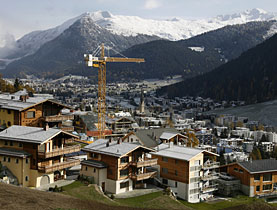
Cabinet charts European policy course

The government has announced plans to strengthen ties to the European Union, and said on Friday it will direct its attention to labour and agriculture accords.
Speaking before the media, Foreign Minister Micheline Calmy-Rey said Switzerland should extend the existing labour agreement with the EU to new member states Romania and Bulgaria.
The accord is part of a package that includes six other agreements on issues including transport and agriculture.
Rightwing political parties have already come out against the agreement, but the government has warned that efforts to block just one could jeopardise all seven.
Justice Minister Eveline Widmer-Schlumpf said efforts to derail the arrangement between Switzerland and the world’s largest trading bloc would have serious economic consequences.
Trade between Switzerland and EU member states is valued at over SFr300 billion ($298 billion) annually.
For their part, labour unions have called for the government to ensure foreign workers are paid fairly.
Agriculture negotiations
The government also announced that it will push for an open agricultural market with the EU – a move it believes will lead to lower prices for consumers.
Economics Minister Doris Leuthard said negotiations would aim to phase out tariffs, quotas and export subsidies on goods entering or leaving the country.
She added that talks would begin in autumn at the earliest and would take place over a period of one to two years.
An agreement could enter into force by around 2016.
The rightwing Swiss People’s Party has already said it will fight the plan by launching a nationwide referendum on the issue, and the government is facing strong resistance from farmers’ unions.
Leuthard argued that global political pressures had played a part in forcing the government’s hand.
“We are under pressure to reduce our tariffs,” she said, referring to World Trade Organization talks.
Benefits for all
But she sought to temper concerns by explaining that despite possible initial difficulties, an open market would end up strengthening Swiss agriculture.
She added that while the government is prepared to support farmers, it would wait until an agreement was negotiated with the EU before discussing any type of compensation scheme.
Leuthard believes that the benefits of free trade – mainly specialisation and productivity boosts – would have “clearly positive” effects amounting to around SFr2 billion per year.
A spokesman for the EU Commission said on Friday that it welcomed the government’s decision and that both parties had a lot to gain from the negotiations.
The EU’s ambassador to Switzerland, Michael Reiterer, said in an interview published in several French-speaking newspapers in Switzerland on Saturday that the dossier would not be linked to a tax disagreement.
The EU maintains that low taxes for holding companies offered by some Swiss cantons violate a free trade agreement. Switzerland has denied this and the dispute is ongoing.
swissinfo with agencies
Switzerland has negotiated agreements with the EU in seven sectors:
· Free movement of people
· Trade in agricultural products
· Public procurement
· Conformity assessments
· Air transport
· Transport by road and rail
· Swiss participation in the 5th Framework Programme for Research
The agreements entered into force in 2002 and are bound together in a single package.
In other words, Switzerland is unable to opt out of some and remain in others.

In compliance with the JTI standards
More: SWI swissinfo.ch certified by the Journalism Trust Initiative






































You can find an overview of ongoing debates with our journalists here . Please join us!
If you want to start a conversation about a topic raised in this article or want to report factual errors, email us at english@swissinfo.ch.